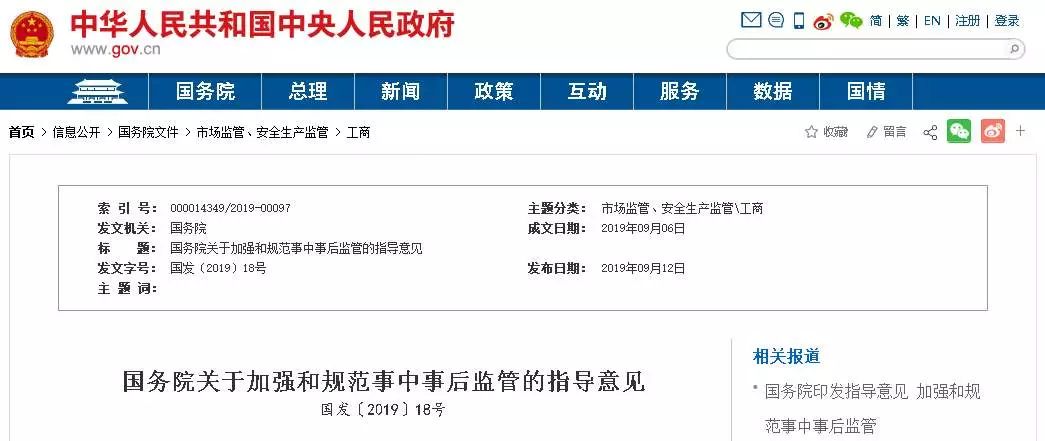The State Council's earliest document to establish a "whistleblower" also mentioned the use of blockchain
Author: Mutual chain pulse Yuan Shang, the original title, "State Department first proposed the establishment of" whistle "document also mentions use block chain"
"War epidemic" is a major event in China and even the world. The war between humans and viruses without smoke may have begun since the birth of human beings, but there are many tools in human arsenals, including blockchain. Mutual Chain Pulse explores the ability of blockchain to fight the epidemic from multiple dimensions. This is the fifth episode of "Blockchain War Epidemic".
After Li Wenliang's death, calls for the establishment of a "whistleblower" system have risen.
But in fact, the State Council of China last year proposed the establishment of a whistler system. On September 12, 2019, the State Council issued the "State Council's Guiding Opinions on Strengthening and Regulating Post-Event Supervision", which explicitly proposed the establishment of a "whistleblower" system. This is the first time at the State Council level to deploy a "whistleblower" system.
- Dr. Xiao Feng first authored in 2020: Blockchain and Global Public Affairs Governance
- Wanxiang Blockchain Lab, Xinchain Space, Parity, and the Web3.0 Foundation jointly announced the launch of Web3.0 Bootcamp
- Viewpoint | Solving the Trust Problem of Charity Activities

Article 16 of the Guiding Opinions clearly states that the role of social supervision should be brought into play. Establish a "whistleblower" and internal whistleblower system, and reward and strictly protect the meritorious personnel who report serious violations of laws and regulations and major risks. Smooth the supervision channels of the masses, integrate and optimize the functions of the government complaint and reporting platform, and strive to achieve "the first response."
At the same time, the "Guiding Opinions" also clearly proposed to use "new technologies such as blockchain to promote regulatory innovation, and strive to maximize regulatory effectiveness, optimize regulatory costs, and minimize disruption to market players."
Whistler and blockchain
The word "whistleblower" originated in the United Kingdom. Police whistle when they found a crime to attract the attention of colleagues and the public. The whistler system originated in the field of food and drug safety in the 19th century in the United States. In 1989, the US Congress enacted the "Whistler Protection Act."
The US plan clearly stated that the personal rights of the "whistleblower" would not be harmed, so that these "whistleblower" would be able to better monitor the daily work of its own units and relevant leaders without worries; at the same time, it proposed a reward plan, such as providing accurate Illegal information and assistance in law enforcement, after the incident, the reporter can share 10% to 30% or even higher fines, compensation and other enforcement results.
The State Council's Guiding Opinions on Strengthening and Regulating Ex post facto Supervision in September last year were intended to "further strengthen and regulate ex post facto supervision, promote fair competition with fair supervision, and accelerate the establishment of a market-based, rule-based, international business environment. This document does not mention areas such as designing public health, food safety, etc. Therefore, when the new crown epidemic broke out, the internal bottom-up report, whistling and other measures did not seem to be available. Li Wenliang and other 8 doctors could only quietly remind people around them.
However, it is not necessary to call the United States. The relevant bill of the Whistler in the United States was formulated in the industrial era, and there are also a lot of problems in the operation process. For example, topics related to agriculture and animal husbandry, such as genetically modified technology and animal rights protection, have been one of the hot topics tracked by many investigative journalists. But in the past decade, eight states in the U.S. have passed bills that prohibit the undercover shooting and distribution of videos or photos of farm activities. The bill is aimed at investigators who report and report animal cruelty. "New York Times" columnist Mark Bitman called it "agricultural jaw law" in an April 2011 column. Currently, more than half of the state legislatures have discussed the bill, and 17 of them have passed it. In those states that have already implemented this bill, its scope of application has been extended to countries such as Australia, and gradually expanded to other industries. This shows that the whistler's legal situation is not optimistic. The reported legal person or employer “beats the rake” and accuses the whistleblower of stealing the agency's property and information according to relevant laws.
Entering the information age, China is at the forefront of the world in the fields of digitalization, artificial intelligence, big data, and blockchain. Using blockchain technology to establish a new "whistleblower" mechanism can achieve the leap of China's "whistleblower" mechanism. development of.
For the "whistleblower", the biggest problem is to avoid the leakage of identity information after the incident, ensure their personal safety, and minimize the impact of the report on the "whistleblower". The current practice in the United States and Japan is to investigate and deal with matters in accordance with legal provisions after the fact, but the impact on the parties has already occurred.

If the blockchain is used, the issue of the identity of the whistling party's identity leakage is hardly to worry about. Assume that CDC (China Centers for Disease Control and Prevention) has established such a set of whistleblower systems based on blockchain, and the system is linked to doctors, hospitals, testing equipment, etc. Doctors such as Li Wenliang will report what they know directly. When the system receives similar information from multiple hospitals, as well as information from testing machines, cross-checks the authenticity and triggers the threshold, and the smart contract automatically activates the epidemic prevention response mechanism. Due to the use of blockchain, the identity information of doctors such as Li Wenliang is encrypted and will be well protected.
At the same time, the reward for the whistler can also be executed through the blockchain. For example, in the above system, when the smart contract triggers the start of the epidemic prevention mechanism, the cost saved for the country and society can be used to reward the contributors. Blockchain is the best at this aspect. Banks and other financial institutions have joined this system. The information reported by doctors such as Li Wenliang obtained corresponding records to prove that the whistleblower token was obtained. According to the distribution mechanism agreed in the smart contract, the bonus went directly to the Li Wenliang personal account through the CDC reward account, and through privacy protection mechanisms such as ring signatures. CDC, banks 2. The hospital where Li Wenliang is located does not know who received the reward.
Regulation and blockchain
In addition to its contribution to the "whistleblower" system, blockchain also has "use" in the construction of other early warning mechanisms. One of the "basic principles" in the "State Council's Guiding Opinions on Strengthening and Regulating Post-Event Supervision" is scientific and efficient. Give full play to the role of modern science and technology in supervision after the event, rely on new technologies such as the Internet, big data, the Internet of Things, cloud computing, artificial intelligence, and blockchain to promote regulatory innovation, and strive to maximize the effectiveness of supervision and the cost of supervision. Optimize and minimize interference with market players.
In January of this year, Yao Qian, the director of the Science and Technology Supervision Bureau of the China Securities Regulatory Commission, wrote an article in the China Financial Computer magazine to analyze the current status of the development of technology supervision in global capital markets. According to Yao Qian, in the past ten years, the cost of computing power and data storage has fallen sharply, and the processing power of computers has been greatly improved, which has effectively promoted the rise of data technologies such as artificial intelligence and machine learning. At the same time, innovative technologies such as cloud computing and blockchain are developing rapidly. These technologies can not only be used for commerce, but also support regulation.
Current regulations are mostly after the fact, and often occur after significant losses. Including this outbreak, there is the previous P2P chaos.
The difficulty of supervision in the matter lies in the timeliness and authenticity of the information.
In the "Information Internet" phase, the timeliness of information can already be resolved. For example, the "smoke index" has achieved good results in the P2P blow. Around 2016, with the assistance of various departments in Beijing, including the Internet, public inspection law, industrial and commercial taxation, and all public information, it began to be gathered on this big data monitoring and early warning illegal fundraising platform. The "smoke index" is used to measure the harmfulness of the online loan platform, and it is mainly judged by the five dimensions of the deviation of the rate of return, the complaint rate, the spread of falsehood, the degree of institutional compliance, and suspected illegality. For platforms with a "smoke index" of more than 60 points, relevant departments should be included in the key supervision. If the score exceeds 80 points, the political and legal organs should promptly start the crackdown and disposal procedures. It is reported that the daily data volume is up to 50 million.
However, P2P companies also noticed the monitoring of the "smoke index" and started writing articles on data. So far I know how to wait for the platform and how to reduce the "smoke index" content.

Because the information Internet can be copied and tampered with, there is a large amount of false information. Therefore, a large amount of computing power and the development of "de-fake and save the truth" are still needed in the later stage, and a lot of costs are wasted. The blockchain considers the authenticity from the beginning of data production, and guarantees the authenticity of the data after the chain is launched. On the contrary, it is very cost-effective in terms of data processing during and after the event.
Back to the "Guiding Opinions" issued by the State Council, whether it is the whistler system or the application of blockchain in supervision, they can be promoted in various administrative fields, and I hope to land as soon as possible.
This article is the original [Interlink Pulse], please indicate the source when reprinted!
We will continue to update Blocking; if you have any questions or suggestions, please contact us!
Was this article helpful?
93 out of 132 found this helpful
Related articles
- Babbitt column | Cai Kailong: Tesla is the next Bitcoin or Apple
- Bitcoin returns to $ 10,000 after Fed chairman Powell acknowledges digital currency is being developed
- Maker multi-collateral Dai migration is coming to an end, and DeFi financial competition will become the main battlefield in the future?
- Tracking patients, alleviating the shortage of masks, deploying supplies … Can the blockchain become a magic weapon to fight the epidemic?
- ECB President Lagarde: Hopes to assess whether central bank digital currencies can serve the public and support ECB goals
- Will Bitcoin's death spiral stomp really happen?
- Fed Chairman: China has not officially started creating digital dollars, China's new crown virus could hurt global economy





